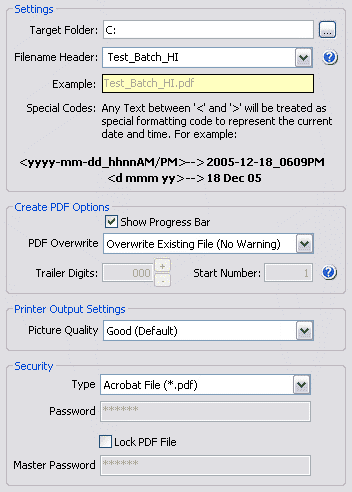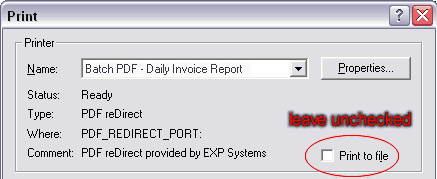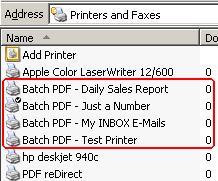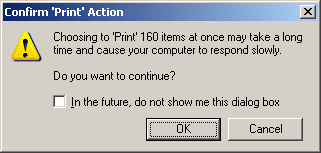|
|
|
What
are Batch PDF Printers?
Batch PDF Printers are PDF printers that you
create (up to 8 of them) where the target path and filename are preset
by you. So, if you create many PDFs with the same name, then this is
the tool for you to convert many files very quickly.
You can also specify to include in the filename:
Note:
This feature was expressly requested by one customer in
particular and is an excellent suggestion!
|
|
Step 1 |
|
Setup a Batch Printer
|
|
Step 2 |
|
Create a New "Batch PDF" Printer.
Click on the "Add" Button, and enter a name for
your new printer.

|
|
Step 3 |
|
Change Your Settings for that Printer.

-
Target Folder Type or Browse to the path
where you want the files saved.
-
Filename. The filename is divided into two
sections:
-
Header. Is simply text of your choosing. You can choose the "AUTOMATIC" feature from the dropdown: the name
of the document being printed will automatically be used to create
the filename of the PDF. For example, if you are editing a
document called "Schedule.doc", the filename created will be "Schedule.pdf".
You can insert the date and time anywhere in
the header by placing the date and time code in between carets
("<" and ">"). The codes and samples are included in the program.
Just click on the small blue help icon.
-
Trailer. Here, you specify the format of
any trailing numbers if you want the files to be numbered
sequentially. You can specify how many digits you expect to have
to use, and you can specify a starting number if for some reason
you don't want to start at zero. For example, if you are placing
PDF files in a new folder, but you want them to continue the
sequence from other files in a different number.
-
PDF Overwrite.
The following options for creating a PDF file are available.
-
Overwrite Existing File (No Warning).
Creates a new PDF and overwrites any file found with the same
filename.
-
Overwrite Existing File (Give
Warning). Creates a new PDF only if there is no file
by that name that already exists. If such a file is found, the user
is asked if he or she want to write over the existing file.
-
Create New File with Sequence Number.
Creates a new PDF using the next sequence number using the format
you specify: For example:
-
Append Output to Existing File.
The output PDF is added at the end of the existing file if one is
found. Otherwise, a new file is created.
-
Prepend Output to Existing File.
The output PDF is added at the front of the existing file if one
is found. Otherwise, a new file is created.
-
Note: If you specify dates or times as
part of the filename, a new
file will be created when the date changes. This allows you to have
a different PDF file for each month, or each day. This is great to
ensure the PDF file does not get too large.
NOTES:
-
In Windows 98, ME, and 2000,
it is important to have the number of "Trailer Digits" set to 4 or
5 zeros so that the numbers are written as "0001", then "0002",
"0003" etc. This will ensure that the files are listed in the
correct order in Windows Explorer. (because Windows thinks that
"2" is greater than "100" because it compares the "2" to the "1"
in "100")
-
Windows XP recognizes correctly
that "2" is less than "100" and will list the files in the correct
order (although some purists disagree with that thinking)
-
If you created encrypted PDF files
that "Append" or "Prepend" the output and you decide to change the
Master Password later in the future, the Append and Prepend will
fail to work (unless you manually change that password of the file
too by decrypting the file and re-encrypting it afterwards.
-
Locking the PDF will apply all
protection options (No Printing, No Editing, No Adding Notes, No
Copy-and-pasting)
|
|
Step 4 |
|
 Select
"Print" from your application (Word®, Excel®,
etc.)
|
|
Step 5 |
|
In the
Print Dialog, Select the Batch PDF Printer you created. Do not choose to "Print
to File", this option is to create printer files (.prn), not PDF files
(.pdf).
 |
|
Step 6 |
|
Click on
the "Print" Button.
Your PDF file will be created
automatically. A progress bar will appear momentarily to show you that
the PDF was properly created unless you selected not to show the
progress bar in the settings for this batch printer.
|
|
|
|
Please note the following.

-
Batch Jobs. You can convert multiple files
to PDF at once by selecting multiple files in Windows Explorer,
"right-click" on the selected files, and then choose "Print...". Note
that you may get the following warning from Windows:

WARNING: Do not take this warning lightly. In this
case, 160 documents will be converted to PDF files. If you click on
"OK", you will see your mouse freeze while the Microsoft Printer Spool
Process creates the 160 printer jobs. This may take a few minutes or
more until all the jobs have been created and converted to PDF files.
|
|
|
|
|
|




